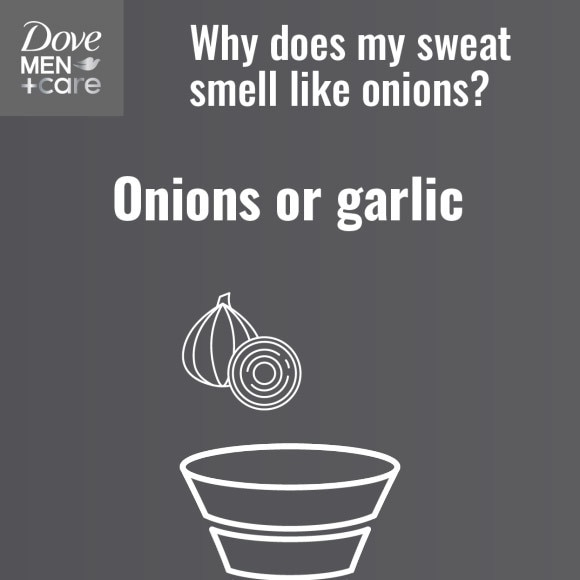WHAT CAUSES SWEAT TO SMELL LIKE ONIONS?
Here’s the science: not all sweat is the same. Your body has two main types of sweat glands — eccrine and apocrine. The apocrine ones, which are located in areas like your underarms and groin, are responsible for stress and emotional sweating. The kicker? They release a thicker, protein-rich fluid that bacteria love. When those bacteria break it down, they produce that telltale oniony smell.
Hormonal shifts — think puberty, intense stress, or even certain medications — can also ramp up sweat production, making the smell more noticeable. And let’s not forget personal hygiene gaps. If you’ve skipped a few showers or aren’t exfoliating regularly, you’re giving that odor more of a stage to shine.
WHY DIET MIGHT BE BEHIND YOUR ODOR
You really are what you eat and if your meals are heavy on garlic, onions, broccoli, or cabbage, your sweat might carry the receipt. These foods are loaded with sulfur compounds that don’t just get digested and disappear. They’re metabolized and released through your sweat, especially in the underarm area.
High-protein diets, like keto or paleo, can also bring the funk. They ramp up amino acid breakdown, which creates waste products that can mess with your body odor. And alcohol and caffeine can also play a role. Both can dehydrate you, concentrating your sweat and making it more pungent.
None of this means you have to cut these foods out completely, but it’s good to understand the link between your plate and your armpits.
HOW STRESS SWEAT IS DIFFERENT (AND SMELLIER)
Ever noticed how a nerve-wracking meeting or an awkward first date can leave you drenched — and smelling worse than after a workout? That’s stress sweat doing its thing.
Unlike heat-induced sweat from your eccrine glands, emotional stress triggers your apocrine glands. These glands are the ones that release that milky, protein-filled sweat bacteria feast on. Anxiety, adrenaline, cortisol — all these can dial up your odor, fast.
And here’s the kicker: stress sweat doesn’t just smell worse; it clings to your clothes longer. Which brings us to…
CAN CLOTHING MAKE ONION-SMELLING SWEAT WORSE?
Tight, synthetic fabrics trap sweat and bacteria against your skin, creating a humid little greenhouse under your shirt.
Breathable fabrics like cotton or moisture-wicking athletic wear are your friends here. They let your skin breathe and help sweat evaporate faster. But even good clothes need proper upkeep — if you’re re-wearing unwashed shirts, you’re basically layering on yesterday’s bacteria. Quick-drying clothes and regularly doing laundry is essential.
HOW TO STOP SWEAT FROM SMELLING LIKE ONIONS
So, how do you tackle this onion-y issue? A few small tweaks can make a big difference:
- Shower after workouts or stressful events. You’re washing away sweat and the bacteria that feed off it.
- Exfoliate a few times a week. This clears away dead skin cells and helps prevent odor-causing buildup.
- Switch to a high-performance deodorant or antiperspirant. Something like Dove Men+Care Clean Comfort Deodorant Stick is a solid option. It’s strong enough for gym sweat, work stress, and everything in between.
- Stay hydrated. Water helps flush odor-causing compounds from your system.
- Keep your laundry rotation tight. No rewears unless they’re freshly washed.
If the onion smell isn’t budging even after dialing in your hygiene and habits, it might be time to look a little deeper.
WHEN TO SEE A DOCTOR ABOUT SWEAT THAT SMELLS LIKE ONIONS
Most of the time, oniony body odor isn’t anything serious. But if you’ve suddenly started smelling different, and especially if it comes with fatigue, weight loss, or changes in your skin, check in with your doctor.
In rare cases, strong or unusual body odor can be linked to medical issues like metabolic disorders, infections, or hormonal imbalances. Trust your gut — if it feels off, it’s worth getting checked out.
FAQs
Can shaving underarms reduce onion-like odor?
Less hair means fewer places for bacteria to hang out and do their thing. It won’t erase odor completely, but it can help minimize it.
Does drinking more water help reduce sweat smell?
Staying hydrated dilutes your sweat, making it less concentrated (and less pungent). Aim for 8–10 cups a day, especially if you’re active.
Can I still eat onions if my sweat smells like them?
No need to swear off flavor. Just be mindful of how often you’re loading up on sulfur-rich foods, especially if you’ve got a hot date or big event coming up. Balance is key.
Onion-y sweat isn’t weird; it’s manageable. With the right hygiene habits and lifestyle tweaks, you can tackle this issue confidently. Between your sweat glands, your diet, and a little stress, it’s a totally normal phenomenon that’s a lot more common than guys like to admit.
The fix? Solid hygiene habits, a few smart swaps, and using products like Dove Men+Care that work with your body — not against it.









